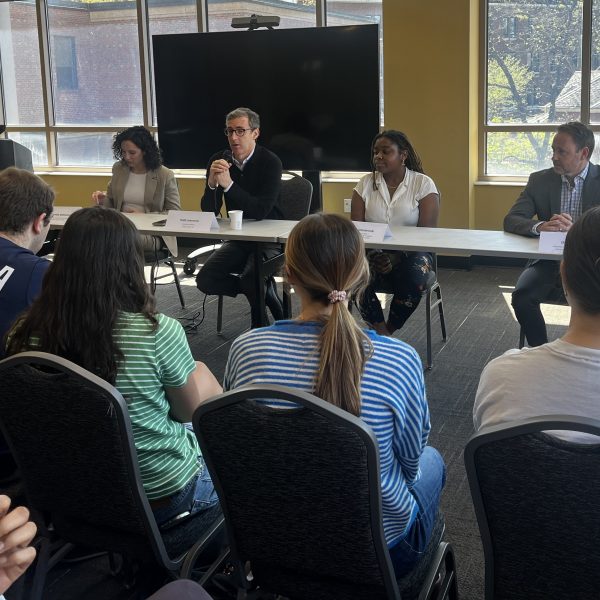A new course on planetary health and resource sustainability sponsored by the Vanderbilt Center for Sustainability, Energy and Climate featured guest speakers in a panel discussion on April 10, 2025, that focused on climate change, urban heat islands and public health.

The panel was comprised of top Tennessee public health officials, including John Vick, Office of Primary Prevention with the Department of Health and Kendra Middlebrook, Environmental Epidemiology Program, Department of Health. In addition, government and non-profit sector leaders working to address challenges associated with growth and climate change included Kendra Abkowitz, senior director of Sustainability and Resilience, Nashville Mayor’s Office; and Todd Lawrence, executive director of Urban Green Lab.
Each panelist responded to two questions posed by the moderator and assistant professor Yolanda J. McDonald, who co-designed the course with Kayla M. Anderson, Community Action and Research Ph.D. candidate.
The questions were framed to focus on a planetary health approach to resource sustainability, climate change, health equity and community power. The panelists were asked:
- What are the biggest climate change challenges facing Tennessee and Nashville?
- What are some strategies being taken to address climate change, including public health outcomes?
The panel was the final group of speakers who shared their expertise with students. The Planetary Health Approach to Resource Sustainability course was designed to provide students with an opportunity to interact with subject matter experts on course topics and to contextualize theory and methods, offering a window into the world of applied research.
“We were so lucky to hear how planetary health is addressed at the state and local level,” said Lizzie Patel, a double major in engineering science and human and organizational development. “It was inspiring to hear how, even in a difficult political climate, organizations are still able to prioritize what truly matters: trying to keep people and our planet as safe and healthy as possible.”
Added Ella Nordlie, a double major in human and organizational development and business, “having the honor to hear from leaders working at the intersection of public health and climate change allowed me to gain a deeper understanding of how systemic challenges—such as urban heat and resource inequity—require data-driven strategies, but ultimately depend heavily on community involvement and action. I left the panel with an immense appreciation for how collaborative, localized efforts can truly transform planetary health efforts and resource sustainability initiatives.”
In their closing comments, all the panelists agreed that voting—at the local, state, and federal levels—is the most effective action students can take to combat climate change.
Students from the Health Equity and Community Power class also attended the panel discussion. The course is to conclude with a final project poster presentation scheduled for April 22, 2025, from 10 a.m. to 12 p.m. at 6 Magnolia, Room 203. Light refreshments will be provided.